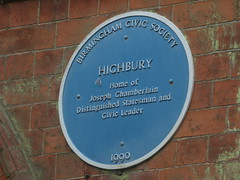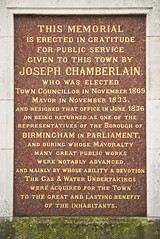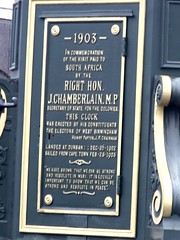Joseph Chamberlain MP


Joseph Chamberlain MP
(1836-1914)
statesman, Town Councillor (1869-1873), Mayor of Birmingham (1873-1876), and Member of Parliament (from 1876)
Family tree
Commemorated on 5 plaques
Joseph Chamberlain (1836-1914) lived here
25 Highbury Place, Islington, N5, London, United Kingdom where they lived
Joseph Chamberlain (1836-1914) lived here
188 Camberwell Grove, Southwark, SE5, London, United Kingdom where they lived
Highbury Home of Joseph Chamberlain Distinguished Statesman and Civic Leader
Highbury Hall, Yew Tree Road, Moseley, Birmingham, United Kingdom where they was
This Memorial is erected in gratitude for public service given to this town by Joseph Chamberlain, who was elected Town Councillor in November 1869 Mayor in November 1873, and resigned that office in June 1876 on being returned as one of the borough of Birmingham in Parliament, and during whose mayoralty many great public works were notably advanced, and mainly by whose ability & devotion the Gas & Water undertakings were aquired for the town to the great and lasting benefit of the inhabitants.
Chamberlain Memorial - Chamberlain Square, Birmingham, United Kingdom where they was
1903 In commemoration of the visit paid to South Africa by the Right Hon. J. Chamberlain MP Secretary of State for the Colonies, This clock was erected by his constituents the electors of West Birmingham Henry Payton, J. P. Chairman. Landed at Durban: : Dec-26-1902 Sailed from Cape Town Feb-25-1903 "We have shown that we can be strong and resolute in war: it is equally important to show that we can be strong and resolute in peace".
Joseph Chamberlain Memorial Clock - Warstone Lane / Vyse Street / Frederick Street, Birmingham, United Kingdom where they is commemorated


_LIVED_HERE.jpg?width=250)


